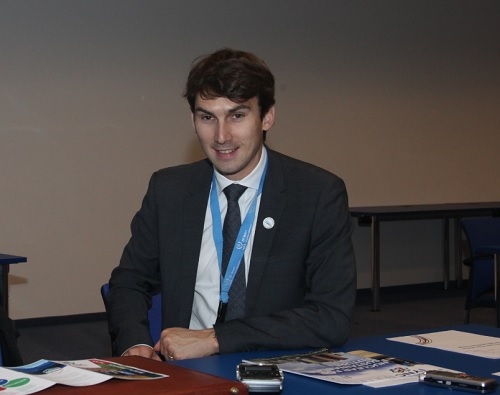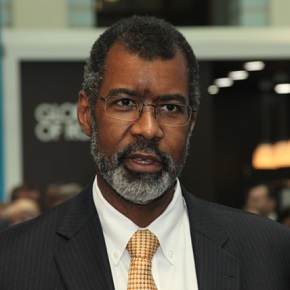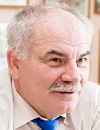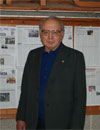 |
||
|
Denis Janin: young is determined on heart AtomInfo.Ru, PUBLISHED 24.10.2017 The IAEA's 61st General Conference was held in Vienna on 18-22 September 2017. On the sidelines of the conference the AtomInfo.Ru journalists have spoken to Denis Janin, president of the International Youth Nuclear Congress. CONTINUED BELOW Denis Janin  Mr Janin, please explain to our readers what is the IYNC? The International Youth Nuclear Congress (IYNC) is a non-profit organization started as a movement in 1997, we are now celebrating our 20-year anniversary. From the very beginning, we had support from the Russian Federation and personally from Mr. Victor Murogov, from the IAEA, the USA, the Republic of Korea, the European Nuclear Society, France, Germany and many other countries and organizations. Our congress is now a large global network joining 50 countries and non-governmental organizations. We are gathering the national nuclear young generation networks (YGN). For example, in Russia you have the Russian nuclear society which has the youth council what is in turn represented in the IYNC. Is it the same principle for other countries? Almost the same. In some countries as I said the youth nuclear society is linked to the national nuclear society like in Russia or France, but in some countries the young nuclear organization is independent like in the UAE. There are also the countries where just one or two people are involving in our activities. I could mention Nigeria, where the process to develop the young nuclear movement is ongoing. The IYNC is supporting their activities because it is part of our mission to support the development of new YGN networks. You say young, youthЕ But what do you mean by these terms? Certainly, the young is determined on the heart. But you are right, it should be some formal definition. The upper age limit depends on each national YGN organization. In France it is 35, in China it is 40, in the IYNC it is 37 according to our rules to be elected in steering roles, for example to sit at the IYNC Board of Directors. What are the main activities of your congress? The IYNC was created to support the knowledge transfer between generations and across international boundaries. It is a good idea but we remember how and why many youth nuclear societies have been created some 20 years ago. The industry has realized that it is ageing and it was necessary to do something for attracting young people. Do you continue such work nowadays? I fully agreed with you, it is a very important and challenging task. At the IAEA general conference we have a side event devoted to the future of nuclear and the role of young generations, and it is exactly what I am talking about - the role of YGN in attracting, developing and retaining young professionals in nuclear science and applications. Knowledge transfer is why the IYNC was created at first and remains the main role of IYNC. In addition our mission has expanded and we now also focus on developing new approaches to communicate benefits of nuclear power, as part of a balanced energy mix, and promoting further peaceful uses of nuclear science and technology for the welfare of mankind.Е ...and communications between young specialists and veterans? Certainly, yes. Just a couple of hours ago I had a meeting with Mr. Victor Murogov, chairman of the international union of veterans of nuclear energy and industry (IUVNEI) and we have discussed the actions we can establish together to support knowledge transfer. Please give us some example of these actions. The IUVNEI is now working with IYNC support on a list of experience from knowledgeable professionals. We will list the topics and the languages they can speak. Once we have that list we could use it to invite these experienced people to the IYNC mentoring program. There are different programs for the knowledge transfer in the nuclear field. What is the highlight of your activity? The activity of the IYNC is unique compared to many other organizations because of our wide network structure. As I said we represent directly in 50 countries and such a wide network gives us rare opportunity from the point of the knowledge transfer. Will you invite veterans for mentoring courses in person or you will use any telecommunication methods? We are in talks to establish online ways to transfer knowledge. The IYNC will support the webinars and the online videos. I have to mention that all of this is under development, we are still looking for the best solutions. Will the veterans' knowledge be of the restricted access - say, for the IYNC members or something like this? The idea is to open it as widely as possible. We have to define it together with our senior colleagues from the IUVNEI because this is not defined yet. To me, the more we can spread such information the better it would be. We have to consider intellectual property aspects as well but looking at nuclear safety for example, it is obvious sharing knowledge and best practices would benefit to everyone. In that sense I agree with IUVNEI we should focus on critical knowledge. We do not need to transfer all knowledge but we must specify and transfer the critical one. Let us return to the challenge of attracting and retaining young professionals. What are you doing in this field? IYNC main activity is the organization of a bi-annual conference where students and young professionals are invited to discuss opportunities and challenges in nuclear science and applications. IYNC also supports the communication of nuclear power role in the fight against climate change. Recently we also launched an innovation contest, the I4N "Innovation4Nuclear" innovation contest. We also provide best practices and experience feedback to national YGNs. On a daily basis it is before all the role of the national young generationnetworks. This work is different in various countries. Yes, maybe it is more easily in China or Russia but it is more difficult in Germany. For sure, there is no unified solution for all the countries in the world. On other hand, the best practices can be shared. For example, we can organize in France or Germany lectures with recognized speakers who present the positive sides of nuclear science and technology and combine it with a networking event for young participants. The experience shows this works very well, people are relaxing and discussing serious matters simultaneously. Maybe this practice can be suitable for other countries. I give you one more interesting example. In Finland our colleagues organize the meetings in saunas. Oh, it is very innovative practice! Yes, it is good for Finland and it could be good for some other countries. While attracting young people to nuclear, the challenges are different but the practices could be shared. As we know the IYNC organizes the international conferences for the young nuclear professionals. Right, and the next one will be held in Bariloche, Argentina on 11-17 March 2018. For the first time we will host it together with the Women in Nuclear (WiN). We will have technical tracks in which anyone can present its work via an oral presentation or poster, plenary sessions, workshops, a mentoring program, technical tours and other programs. The conference will provide a forum for young professionals and women in the nuclear field to discuss and collaborate on knowledge transfer, nuclear science and technology research and implementation, professional development, and communication. In particular, the conference brings together young professionals that are looking to further develop their careers and senior leaders that are willing to share their knowledge and expertise with younger generations. Thanks, Mr Janin, for the interview for the AtomInfo.Ru online newspaper. Topics: Interview Other news: 443 nuclear units are operating in the world Another 65 units have the status of the being built one. New American submarine will be named after admiral Rickover 60th anniversary of the first trip of the nuclear submarine Nautilus. Westinghouse will deliver CE16NGF fuel on Palo Verde This is a new generation fuel for 16×16 grid. |
Hero of the day 
William D. Magwood IV: Make innovations available as soon as possible Well, innovation is going to be one of the most important issues facing the nuclear field over the next several years. We are working on several important initiatives in this area, including an activity called Nuclear Innovation 2050. INTERVIEW
Oleg Grudzevich OPINION
Rudolf Baklushin |

